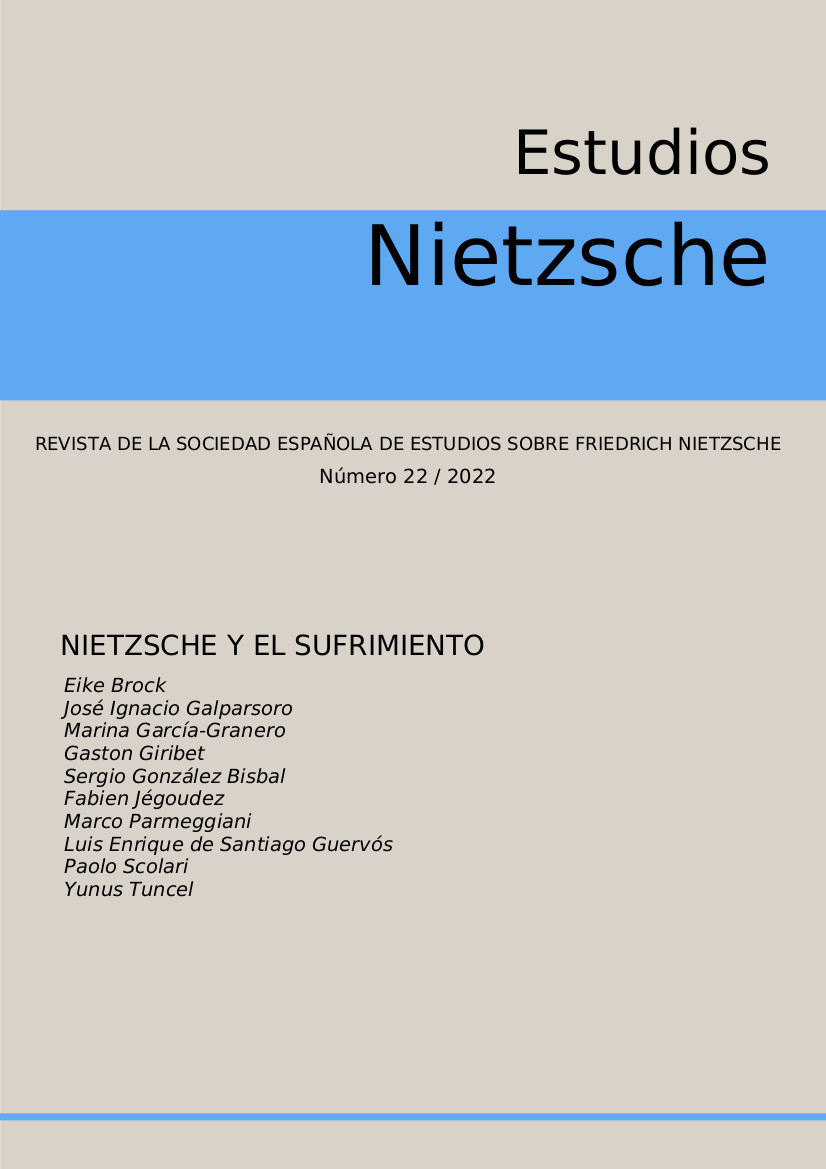The THe great pain and the meaning question
DOI:
https://doi.org/10.24310/EstudiosNIETen.vi22.13991Keywords:
great pain, meaning, suspicion, gay scienceAbstract
Through a reading of the second prologue for The gay science and some biographical notes, the concept of great pain and its implications are investigated, especially those referring to the question of meaning, insofar as its irruption produces a fall in nonsense, which is an ordeal that only a few, the true philosophers, will be able to endure and transform into jovial science.
Downloads
Metrics
References
CORONEL PIÑA, Víctor Ignacio. «El sentido trágico del sufrimiento en Nietzsche»: Revista de Filosofía (Universidad Iberoamericana) 138 (2015), 125-144. http://revistas.ibero.mx/filosofia/uploads/volumenes/9/pdf/Revista-filosofia-138-web.pdf
GERHARDT, Volker. «La gran razón del cuerpo. Un ensayo sobre el Zaratustra de Nietzsche»: Enrahonar 35(2002), 31-43. https://www.raco.cat/index.php/Enrahonar/article/download/32011/31845#:~:text=El%20cuerpo%20es%20concebido%20
por,al%20tiempo%20individual%20y%20comunitario.
GONZÁLEZ BISBAL, Sergio. El animal enfermo. El pensamiento de Nietzsche como pensamiento de salud y enfermedad (tesis doctoral, 2018). http://hdl.handle.net/10803/665676
MORALEJA, Alfonso. «Nietzsche y la “gran política”»: Cuaderno Gris, Época III, 5 (2001), 9-24. http://hdl.handle.net/10486/319
NIETZSCHE, Friedrich. Correspondencia (6 volúmenes, edición dirigida por Luis Enrique de Santiago Guervós). Trotta. Madrid, 2005.
NIETZSCHE, Friedrich. Digitale Kritische Gesamtausgabe Werke und Briefe (eKGWB) http://www.nietzschesource.org/#eKGWB
NIETZSCHE, Friedrich. Así hablo Zaratustra, traducción de Alejandro Martín Navarro, en Obras completas (4 vols., edición dirigida por Diego Sánchez Meca), Tecnos, Madrid, vol. IV, 2016.
NIETZSCHE, Friedrich. Correspondencia (6 vols., edición dirigida por Luis Enrique de Santiago Guervós), Trotta, Madrid, vol. IV, 2010.
NIETZSCHE, Friedrich. Crepúsculo de los ídolos, traducción de Joan B. Llinares, en Obras completas (4 vols., edición dirigida por Diego Sánchez Meca), Tecnos,
Madrid, vol. IV, 2016.
NIETZSCHE, Friedrich. De la genealogía de la moral, traducción de Jaime Aspiunza,
en Obras completas (4 vols., edición dirigida por Diego Sánchez Meca), Tecnos,
Madrid, vol. IV, 2016.
NIETZSCHE, Friedrich. El caminante y su sombra (Humano, demasiado humano,
vol. II), traducción de Marco Parmeggiani, en Obras completas (4 vols., edición
dirigida por Diego Sánchez Meca), Tecnos, Madrid, vol. III, 2014.
NIETZSCHE, Friedrich. El nacimiento de la tragedia, traducción de Joan B. Llinares, en Obras completas (4 vols., edición dirigida por Diego Sánchez Meca), Tecnos, Madrid, vol. I, 2011.
NIETZSCHE, Friedrich. Fragmentos póstumos (4 vols., edición dirigida por Diego Sánchez Meca), Tecnos, Madrid, vol. IV, 2006.
NIETZSCHE, Friedrich. La gaya ciencia, traducción de Juan Luis Vermal, en Obras completas (4 vols., edición dirigida por Diego Sánchez Meca), Tecnos, Madrid, vol. III, 2014.
SLOTERDIJK, Peter Crítica de la razón cínica, (trad. de Miguel Ángel Vega). Madrid, Siruela, 2007.
SLOTERDIJK, Peter. El pensador en escena. El materialismo de Nietzsche (trad. de Germán Cano). Pre-textos. Valencia, 2000.
Downloads
Published
How to Cite
Issue
Section
License
As of issue 21 (2021) this journal is published only in open access (diamond route).
From that number 21, like the previous numbers published in NIETZSCHE STUDIES, they are subject to the Creative Commons Acknowledgment-NoComercia-ShareIgual 4.0 license, the full text of which can be consulted at <http://creativecommons.org/licenses/by-nc-sa/4.0 >
It is the responsibility of the authors to obtain the necessary permissions of the images that are subject to copyright.
This work is licensed under a Creative Commons Attribution-NonCommercial-ShareAlike 4.0 International License.
Copyright generates two different rights: moral rights and patrimonial rights that EJFB recognizes and respects. Moral rights are those relating to the recognition of the authorship. They are rights of a personal nature that are perpetual, inalienable, unseizable and imprescriptible as consequence of the indivisible union of the author and his/her work.
Patrimonial rights are those that can be derived from the reproduction, distribution, adaptation or communication of the work, among others.







11.png)
